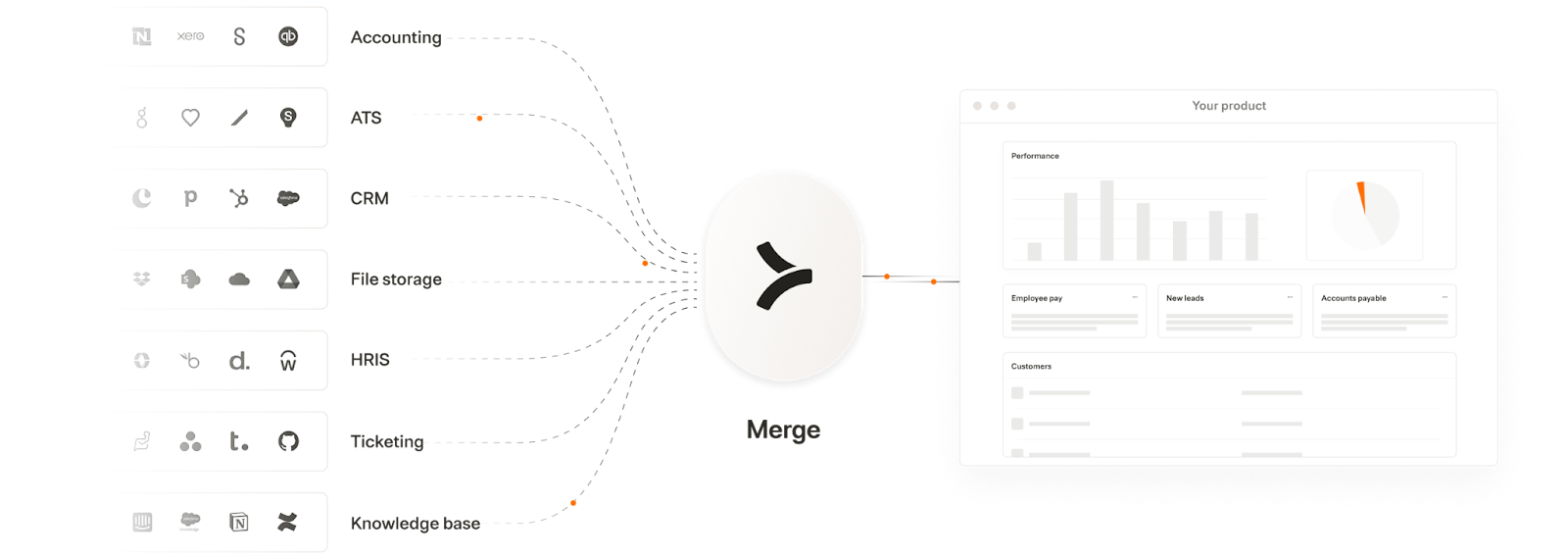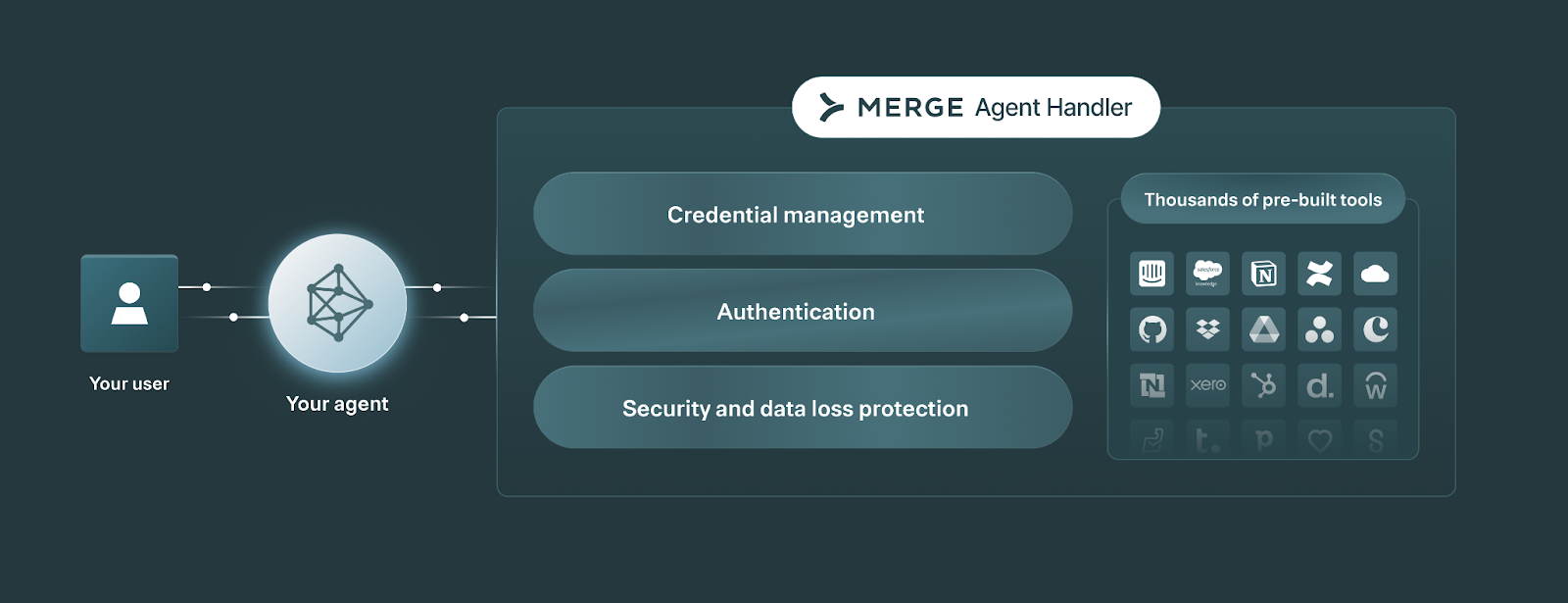Table of contents
MCP vs API: how to understand their relationship
.png)
The Model Context Protocol (MCP) has seemingly become the de facto method for integrating large language models (LLMs) with 3rd-party data sources.
This has led to speculation on the future of APIs and whether they’ll be relevant in a world where AI companies rely on MCP to access data.
In truth, the rise of MCP should only elevate the role APIs play in supporting AI products.
We’ll break down why by highlighting how they work and complement one another.
What is MCP?
The Model Context Protocol is a newly-developed standard from Anthropic that outlines how AI companies can interact with outside data sources, such as SaaS applications, files, and databases.

In basic terms, MCP includes 3 components:
- An MCP client, which the LLM interfaces with directly
- An MCP server, which the data provider offers to expose data and functionality
- Tools, which appear within the MCP client and allow the LLM to take specific actions
It’s also worth noting that the LLM decides on the tool it uses based on the user’s input and the tools it has at its disposal.
For example, say your customer asks your AI chatbot to create a specific ticket on their behalf.
Your LLM would then select a tool specific to creating tickets in that customer’s project management system.

{{this-blog-only-cta}}
What is an API?
An API encompasses a set of protocols and rules that lay out how applications can communicate with one another securely.
.png)
On a more granular level, APIs are made up of endpoints that let you access specific data and functionality from a 3rd-party system. For instance, this endpoint from BambooHR lets you retrieve employees from the HR software: <code class="blog_inline-code">https://api.bamboohr.com/api/gateway.php/{companyDomain}/v1/employees</code>
With all this context in mind, let’s now break down how MCP compares with APIs.
There’s obviously a lot more to APIs. You can learn more about API rate limits, API logs, how APIs differ from webhooks, and more below.
- A guide to REST API authentication
- How to manage REST API rate limits
- What you need to know about API logs
- REST APIs vs webhooks
MCP vs API
APIs can be a part of tools that are available via an MCP server. For example, when an LLM decides on the tool to use, that tool can include making a certain API request and then providing the response to the LLM.
Without APIs, you’d be left with tools that use scrapers—or custom scripts—and this alternative approach would come with several issues:
- Error prone: Simple UI changes can cause these integrations to break; scrapers can also easily fail or get blocked. APIs don’t share these vulnerabilities (though they do require some level of maintenance, depending on the build)
- Infrequent syncs: Scapers can get delayed, as they often depend on brittle workflows, limited scheduling options, and unpredictable third-party site/application behavior. APIs, on the other hand, can reliably sync data extremely frequently, such as every second
- Security vulnerabilities: Scraping may expose sensitive data because it doesn’t use HTTPS encryption, has weak authentication, or mismanages tokens. APIs typically enforce secure transport (HTTPS) and use standardized auth flows (e.g., OAuth 2.0)
In short: Since LLMs need to access near real-time data reliably and securely from 3rd-party systems, APIs offer the best approach to supporting MCP.
Related: How to build a high-performing MCP server
Leverage API or MCP-based connections via Merge
Merge lets you add reliable, secure, and performant integrations to your AI products and AI agents through two products: Merge Unified and Merge Agent Handler.
Merge Unified enables you to integrate your product with hundreds of 3rd-party applications through a unified API. The integrated data is also normalized automatically—enabling your product to support reliable RAG pipelines.

Merge Agent Handler lets you integrate any of your AI agents to more than a thousand tools, as well as monitor and manage any AI agent.

Learn how Merge can support your AI product features and/or your AI agents by scheduling a demo with an integration expert.
API vs MCP FAQ
In case you have any more questions on the relationship between APIs and MCP, we’ve addressed several more below.
When would you use APIs directly instead of an MCP server? (and vice versa)
You should use APIs directly when a workflow is predefined and static. For example, if your organization will continue to follow a consistent process for adding leads from one system (e.g., your marketing automation platform) to another (e.g., your CRM), it makes sense to use APIs.
Direct API requests are also more effective for functionality that relies on accessing and retrieving data from a broad, pre-stored data source, such as a vector database.
For instance, if you’re building enterprise search functionality into your product, direct API requests can query the vector database directly and return structured results. MCP, on the other hand, would require you to dynamically construct and pass context for each query through an LLM, making it less efficient and more costly for large-scale, repetitive data retrievals.
That said, MCP is better suited for dynamic workflows that involve creating or updating data within an application. For instance, if an unexpected product bug arises, the agent can use context from the user to determine which tool to call (such as <code class="blog_inline-code">create_issue</code> in Linear) and pass the appropriate arguments to ensure the issue is resolved quickly—like setting a high priority level and assigning a completion date at the end of the week.
As a general rule of thumb, when you need to retrieve data, you should use APIs directly; and when you need to add or update data, you should use MCP.
What’s the difference between MCP and API responses?
Since MCP can be a wrapper for API endpoints, they can use similar responses. For example, a 401 Unauthorized HTTP status code response from an endpoint can be shown as an error object in the associated tool’s JSON response.
Depending on your MCP server’s implementation, the tool call response can also reference the API response code error, along with a similar message.

However, MCP responses can also represent scenarios that go beyond standard API requests. For example, if an agent is blocked from accessing a tool, the response can include an error indicating that the tool call was blocked or restricted.

Are MCP servers APIs?
MCP servers aren’t APIs.
An MCP server consists of tools that expose functionality from a third-party application or service. And since this functionality often involves calling API endpoints under the hood, MCP servers frequently act as wrappers around API endpoints.
Does MCP offer security advantages compared to giving AI agents direct API access?
MCP servers don’t offer security advantages out of the box.
MCP server providers will need to offer security measures to consumers, like authentication mechanisms (OAuth 2.0) and data-access policies, to control who can access and perform actions on specific data points.
Third-party platforms, like Merge Agent Handler, offer secure MCP servers and make them as safe as direct API access by supporting authentication mechanisms, providing MCP server logs, handling automated alerts, among other security controls.
How does MCP differ from traditional APIs in terms of architecture and communication?
Traditional APIs, such as REST and GraphQL, rely on predefined endpoints or schemas and follow fixed request and response patterns. Clients need to know these endpoints in advance, which means integrations often involve hardcoded paths and ongoing maintenance.
MCP takes a different approach by having its servers expose tools and resources at runtime. This allows AI agents to understand and use available capabilities without hardcoded endpoint integrations. As a result, new tools can be added or changed with minimal client configuration, enabling more flexible and adaptive integrations than traditional APIs.
Can MCP replace APIs?
MCP doesn’t replace APIs; it complements them.
Most MCP servers use existing APIs, and MCP provides a standardized, AI-friendly way to expose these capabilities as tools.
You still need APIs for traditional system-to-system communication, backend integrations, and service architectures. MCP simply makes those capabilities available to AI agents so they can intelligently choose and use the right tools.
How does MCP handle authentication and secret management differently from APIs?
MCP doesn’t include a built-in authentication or secret-management standard. Each MCP server is responsible for implementing its own approach, whether that’s OAuth, API keys, personal access tokens, or custom mechanisms.
As a result, some MCP servers will authenticate clients in ways that are similar to traditional APIs, while others may use entirely different patterns.
What makes MCP more maintainable than traditional API integrations for teams building AI products?
MCP tools are self-describing, so when you need to update a tool on an MCP server, you generally only modify its schema, description, or underlying implementation. The client doesn’t need to change because it discovers available tools at runtime and relies on their structured definitions.
The process of updating traditional API integrations is typically more complex and cumbersome. It requires your engineers to dig into the codebase, locate the specific integration logic, understand custom request/response handling, update hardcoded endpoints and/or payload formats, and ensure changes don’t break other features or shared code paths.



.png)
.jpg)


.png)

